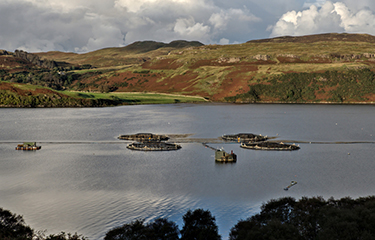With the latest edition of “The State of World Fisheries and Aquaculture” (SOFIA) report, produced biennially by the Food and Agriculture Organization of the United Nations (FAO), finding that the global rate of aquaculture production growth has slowed in recent years, the Federation of European Aquaculture Producers (FEAP) has warned that reversing this trend necessitates generating much greater political support for the industry as a whole.
According to the 2020 SOFIA report, world aquaculture production reached a record level of 114.5 million metric tons (MT), if algae and ornamental seashells and pearls is included, with 82.1 million MT of aquaculture fish in 2018. That number is also expected to increase by 32 percent to reach 109 million MT by 2030. However, in a statement, FEAP said that these “impressive quantities” should not mask the fact that the global annual growth rate of aquaculture has greatly declined over the last years.
After decades of 6 percent to 10 percent interannual growth rates, 2018 saw an increase of only 2 percent over 2017.
“Two decades ago, Europe already walked that path in advance and, since the turn of the century, aquaculture production in almost all European countries has stagnated,” FEAP said.
In its report, the FAO identifies a number of factors contributing to the worldwide slowdown, including the adoption of broader environmental regulations, reduced availability of water and suitable production locations, increasing outbreaks of aquatic animal diseases, and decreasing aquaculture productivity gains.
While it also recognizes countries achieving aquaculture production growth, such as developing producers like Egypt, India, Indonesia, Vietnam and Bangladesh, and developed aquaculture nations like Norway and Chile, Brussels-based FEAP said that the reasons for these exceptions are region dependent, but a trend is clear: In the twenty-first century, aquaculture growth requires political will to promote appropriate policies, strategies, and private and public investment.
“Certainly, further technical issues have to be addressed on feeds, genetic selection, biosecurity, disease control, digital innovation and business developments,” FEAP said. “But from the European Union we can showcase that solving these hurdles is clearly not enough. Even the adoption of aquaculture spatial planning or ecologically sound technological innovation are necessary but never sufficient.”
The association continues, “European aquaculture producers can warn the rest of the world that the biggest challenge for the continued advancement of this sector is the adoption of appropriate general governance decisions aiming specifically to promote the development of aquaculture amid all other economic activities.”
Educating the public authorities that make decisions that can either enable or hinder aquaculture is also something that will be necessary for aquaculture to thrive, FEAP stated.
“An added problem is that public authorities and decision makers that are responsible for the creation and implementation of such general governance regulations will not read SOFIA 2020,” the organization said. “Quite probably they will have never heard of it.”
Photo courtesy of Phil Silverman/Shutterstock







